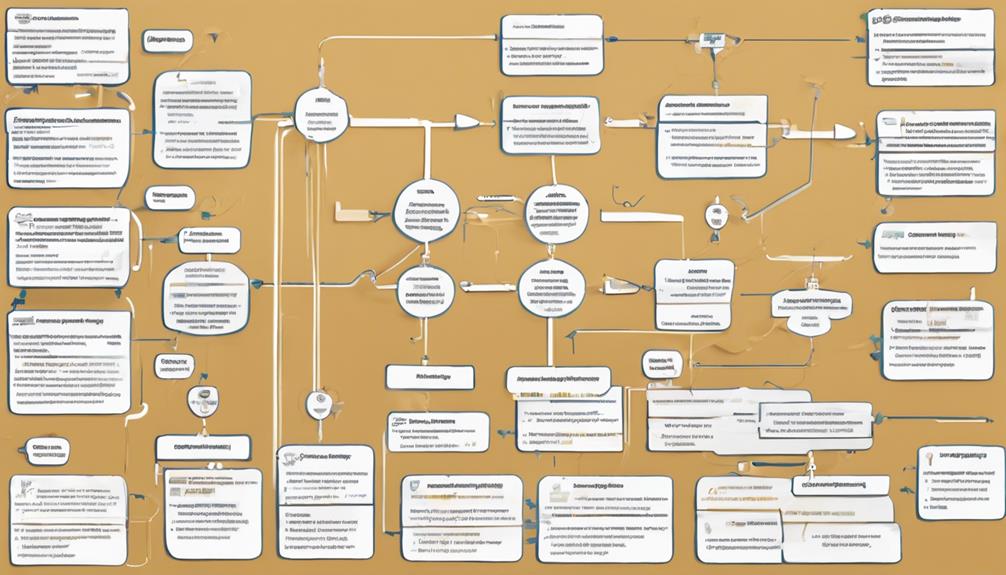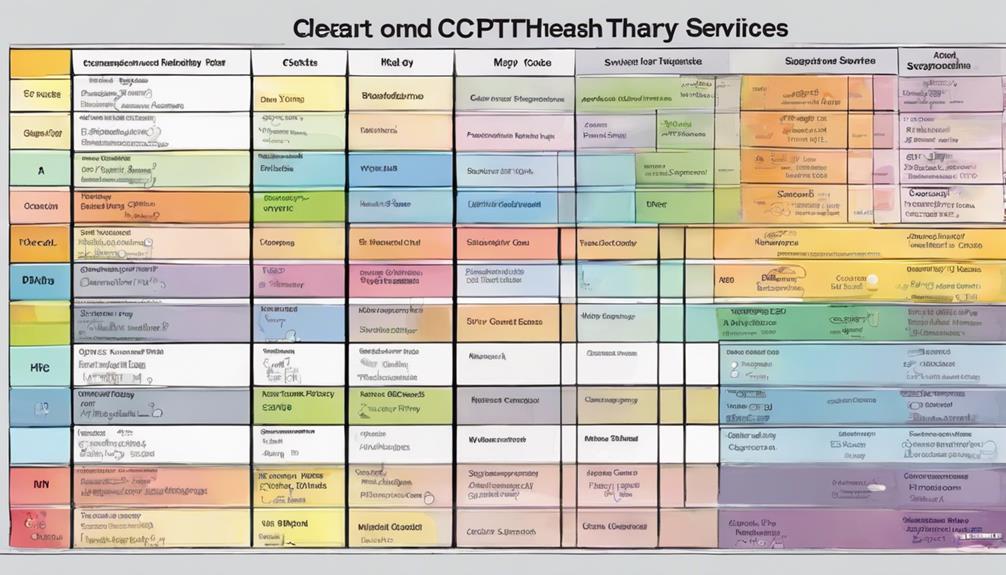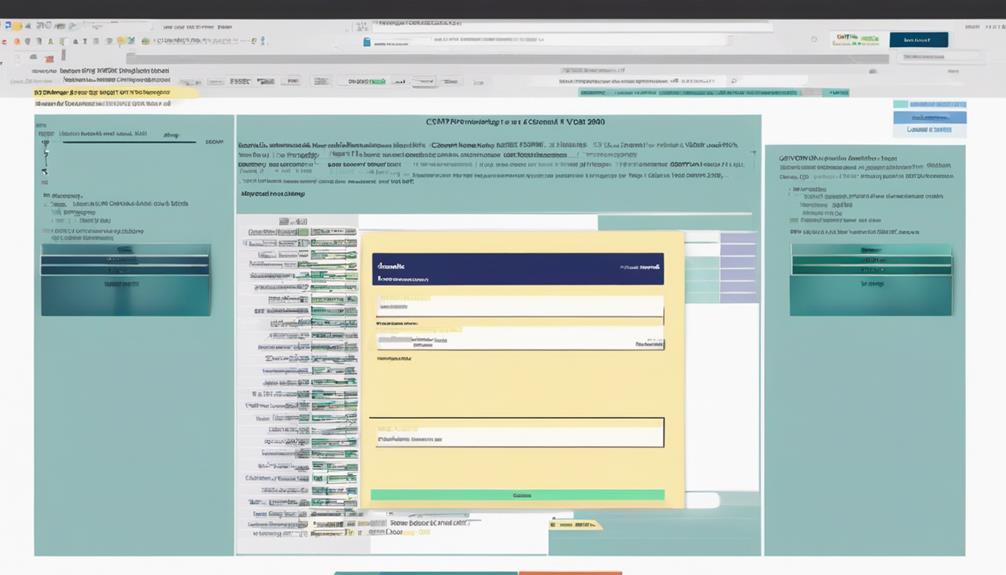In the intricate world of speech therapy, understanding CPT codes can be compared to unraveling a complex puzzle. As professionals in this field, we understand the importance of precise coding for accurate billing and compliance with regulations.
However, in the ever-evolving realm of healthcare, staying abreast of updates and best practices is crucial. Join us as we uncover the nuances of mastering Speech Therapy CPT Codes, delving into key strategies and insights that can elevate your practice to new heights of efficiency and effectiveness.
Key Takeaways
- Master CPT codes accurately for billing precision.
- Document comprehensively to support correct coding.
- Optimize billing for efficient revenue cycles.
- Maximize reimbursement through strategic coding and documentation.
Understanding Speech Therapy CPT Codes
In understanding speech therapy CPT codes, we navigate the essential framework for accurately documenting services provided in speech therapy sessions. CPT codes, specific to speech therapy, are crucial for billing and coding purposes. These five-digit codes are used to report a variety of services, including evaluations, treatments for different speech disorders, and assessments of speech fluency. Proper usage of these CPT codes is vital to ensure accurate billing and reimbursement for speech therapy services.
By correctly applying the appropriate CPT codes, therapy practices can maximize revenue and maintain compliance with coding guidelines. Understanding the nuances of each CPT code related to speech therapy is essential for effective billing and coding practices. It allows for clear communication with insurance companies and ensures that the services provided are accurately represented in the billing process.
Mastering the use of Speech Therapy CPT codes is fundamental to the financial health and operation of therapy practices.
Overview of Speech Therapy Billing

When it comes to the overview of speech therapy billing, we need to focus on the billing process and clarify reimbursement guidelines.
Understanding the billing process is crucial for accurate claims submission and reimbursement. It ensures compliance with insurance requirements and effective revenue management in speech therapy practices.
Billing Process Overview
Navigating the intricacies of speech therapy billing requires a keen understanding of specific CPT codes and meticulous documentation practices. Proper documentation is fundamental for accurate billing and reimbursement in speech therapy.
It's crucial to differentiate between service-based and time-based CPT codes to ensure the billing process is executed correctly. Selecting the appropriate CPT codes is vital for compliance with insurance guidelines and to facilitate timely reimbursement for speech therapy services.
Effective billing practices not only aid in revenue cycle management but also contribute to enhancing overall practice efficiency. By mastering the billing process and understanding the nuances of CPT codes, speech therapists can optimize their billing procedures and ensure smooth financial operations within their practice.
Reimbursement Guidelines Clarification
To ensure optimal reimbursement in speech therapy billing, a thorough understanding of reimbursement guidelines and accurate coding practices is essential. Proper documentation of services provided is crucial to avoid claim denials and ensure timely reimbursement. Compliance with Medicare guidelines and regulations is key for successful reimbursement in speech therapy billing. Staying updated on billing changes and requirements is vital for efficient revenue cycle management in speech therapy practices.
| Key Points | Details | Importance |
|---|---|---|
| CPT codes | Understanding and using accurate codes | Maximizing reimbursement |
| Accurate CPT codes | Ensuring proper coding for services | Avoiding claim denials |
| Documentation | Properly documenting services provided | Essential for reimbursement |
| Medicare | Compliance with CMS guidelines and rules | Ensuring successful reimbursement |
Importance of Accurate Coding
Ensuring coding accuracy impacts reimbursement rates, compliance with billing regulations, and the overall documentation process. It's crucial for maintaining financial stability and adhering to industry standards.
Proper coding practices lay the foundation for effective revenue cycle management.
Coding Accuracy Impacts Reimbursement
Coding accuracy significantly impacts reimbursement rates in speech therapy, playing a crucial role in ensuring proper payment for services rendered. To illustrate,
- Maximizing Revenue: Utilizing the correct CPT codes avoids claim denials and enhances revenue generation in speech therapy practices.
- Compliance Standards: Proper documentation and accurate coding are imperative for adhering to compliance standards and minimizing billing errors.
- Optimizing Processes: Understanding the nuances of CPT codes specific to speech therapy is essential for streamlining billing processes and revenue cycle management.
- Financial Stability: Coding errors can result in delayed payments and financial setbacks, underscoring the importance of mastering speech therapy CPT codes for precise billing practices.
These aspects highlight the critical link between coding accuracy, reimbursement rates, and financial success in speech therapy practices.
Compliance With Billing Regulations
Accurate application of billing regulations in speech therapy practices is essential for maintaining compliance and ensuring timely reimbursement for services provided. Compliance with CPT codes is a cornerstone of accurate billing in speech therapy. By adhering to billing regulations, such as using the correct CPT codes, therapists can minimize claim denials and potential audit issues.
Understanding modifiers and documentation requirements is crucial for billing accuracy. Staying informed about coding changes and regulations is key to successful reimbursement in speech therapy practices. Proper adherence to billing guidelines not not only fosters compliance but also supports the financial health of the practice, allowing therapists to focus on delivering quality care to their patients effectively.
Documentation Supports Coding Accuracy
Thorough and precise documentation in speech therapy plays a vital role in ensuring the correct application of CPT codes for accurate billing and reimbursement. When it comes to coding accuracy, documentation is key. Here are four crucial points to consider:
- Accurate documentation supports the proper assignment of CPT codes.
- Detailed records help in aligning services provided with billed codes for reimbursement.
- Essential elements of documentation include initial evaluations, progress reports, and treatment notes.
- Clear and concise documentation is essential to prevent claim denials and ensure compliance with billing guidelines.
Key CPT Codes for Speech Therapy

What specific CPT codes are crucial for effective speech therapy sessions?
In speech therapy, the use of specific CPT codes is essential for accurate billing and documentation.
CPT Code 92507 is vital for individual sessions addressing a range of speech, language, voice, and communication disorders.
When evaluating speech sound production and expressive language skills, CPT Code 92523 plays a key role.
For a more focused assessment of speech sound production, therapists rely on CPT Code 92522.
Evaluating speech fluency in patients undergoing speech therapy is facilitated by CPT Code 92521.
Additionally, CPT Code 92610 is significant for assessing swallowing function, which is integral to speech therapy treatments.
Understanding and utilizing these CPT codes correctly ensures that speech therapy sessions are properly documented and billed, leading to improved patient care and outcomes.
Time-Based Procedures in Billing

When billing for time-based procedures in speech therapy, it's essential to accurately document the duration of each session. Proper documentation of the session length ensures that the billed CPT codes reflect the actual time spent with the patient.
Meeting the minimum time requirements specified by the CPT codes is crucial for receiving appropriate reimbursement.
Billing for Therapy Duration
Using time-based CPT codes in speech therapy billing accurately captures the duration of therapy sessions provided to patients.
- Proper Coding: Ensuring the correct CPT codes, such as 92507 for individual therapy, are used for accurate billing.
- Detailed Documentation: Including total treatment time, start and end times, and session activities in documentation.
- Maximizing Reimbursement: By accurately reporting session durations, therapists can optimize reimbursement for services.
- Compliance: Following billing guidelines through precise documentation of therapy session lengths is essential for adherence to regulations and standards.
Documentation of Session Length
To effectively document session length in speech therapy billing, it's essential to accurately record the total time spent on each therapy session, including start and end times for precise reporting. This documentation is crucial for utilizing time-based CPT codes in billing accurately. Speech therapists must meticulously document the time spent on each specific service during the session to align with billing requirements.
Detailed records of session length support proper billing and reimbursement processes. By maintaining accurate documentation of session length, therapists ensure that they can justify the services provided and billed. This meticulous approach to documentation not only facilitates billing but also ensures transparency and compliance with billing regulations.
Thorough documentation of session length is fundamental in the billing process to demonstrate the value of the services rendered.
Common Coding Mistakes to Avoid

Let's delve into the critical focus of steering clear of common coding mistakes in speech therapy to ensure accurate billing and reimbursement. Here are some key points to consider:
- Incorrect use of CPT codes, such as using 92507 for evaluation instead of treatment, can lead to claim denials.
- Failing to include required documentation, like progress reports or treatment notes, can result in billing errors.
- Misapplication of code modifiers, like using -59 instead of -GN for speech therapy services, can cause reimbursement issues.
- Not tracking time accurately for time-based procedures, such as CPT code 92526 for swallowing dysfunction treatment, can lead to underbilling.
Maximizing Reimbursement Strategies

Implementing accurate speech therapy CPT codes is essential for maximizing reimbursement and ensuring proper documentation and billing procedures. Utilizing the correct CPT codes for speech therapy services is crucial in optimizing reimbursement.
Tracking the time spent with patients using appropriate time-based CPT codes enhances accuracy in reimbursement and compliance with billing guidelines. Understanding the nuances of speech therapy CPT codes is key to maximizing reimbursement through precise coding and documentation practices.
Incorporating modifiers like -59 and -GN correctly in speech therapy coding can aid in proper reimbursement by offering additional information on services provided. Developing a robust reimbursement strategy in speech therapy involves verifying insurance coverage, streamlining billing processes, and using accurate codes to boost practice revenue.
Documentation Requirements for Billing

As we shift our focus to the Documentation Requirements for Billing in speech therapy, it becomes evident that detailed and accurate documentation plays a pivotal role in justifying medical necessity, ensuring proper reimbursement, and maintaining compliance with billing regulations.
When it comes to speech therapy billing, the following key points regarding documentation requirements should be kept in mind:
- Detailed Documentation: Proper documentation encompasses thorough initial evaluations, comprehensive plans of care, progress reports, and treatment notes to support billing claims effectively.
- Justifying Medical Necessity: Accurate documentation is essential for justifying the medical necessity of the services provided, which is crucial for successful reimbursement.
- Billing CPT Codes: Detailed documentation of caregiver training sessions, intervention strategies, demonstrations, and feedback provided is vital for billing specific CPT codes like 97550, 97551, and 97552.
- Compliance and Audit Readiness: Complete and thorough documentation not only supports successful claim submissions but also plays a key role in revenue cycle management and audit readiness in speech therapy practices.
Handling Claim Denials Effectively

Effective management of claim denials in speech therapy requires a thorough understanding of common reasons for denials and proactive strategies for resolution. Common reasons for claim denials include errors in CPT codes, incorrect use of modifiers, and issues with time-based codes. To address these denials effectively, it's crucial to ensure that medical records are accurate, complete, and support the services billed. Medical records play a vital role in providing the necessary documentation to overturn denials and maintain a healthy revenue cycle management.
One proactive strategy for reducing claim denials is to focus on submitting clean claims with accurate information from the start. This includes double-checking all CPT codes and modifiers before submission. Staying informed about billing and coding changes is also essential to avoid filing errors that could lead to denials. By implementing these strategies and utilizing resources like Neolytix for medical billing services, speech therapy providers can handle claim denials effectively and minimize disruptions to their revenue cycle.
Updates and Changes for 2024

Incorporating the new CPT codes for Caregiver Training in 2024 revolutionizes the services Speech Therapists can provide, enhancing both patient care and billing efficiency. These updates allow Speech Therapists to bill for Caregiver Training without the Patient Present using CPT codes 97550, 97551, and 97552 starting January 1, 2024.
The new CPT codes encompass face-to-face training for caregivers in individual or group settings, providing intervention strategies, verbal instructions, demonstrations, and feedback. Caregiver training services without the patient present cover essential activities such as daily living tasks, transfers, communication techniques, feeding methods, and safety practices.
Understanding and implementing these changes in 2024 can significantly improve reimbursement, compliance, and overall efficiency in speech therapy billing and coding.
- Speech Therapists can now bill for Caregiver Training without the Patient Present using new CPT codes 97550, 97551, and 97552.
- The updated CPT codes include face-to-face training for caregivers in individual or group settings.
- Caregiver training services without the patient present cover activities of daily living, transfers, communication, feeding, and safety practices.
- Implementing these changes can enhance reimbursement, compliance, and efficiency in speech therapy billing and coding.
Resources for Speech Therapy Billing

Moving from the updates and changes for 2024, we now shift our focus to exploring essential resources for speech therapy billing. Proper utilization of CPT codes is fundamental in the medical billing process for speech therapy services. Accurate coding ensures timely reimbursement from Medicare, Medicaid, and private insurance companies. Understanding modifiers and documentation requirements is vital to submit clean claims and prevent delays in payments.
Speech therapists can benefit from outsourcing billing tasks to specialized medical billing services, which can help streamline the billing process and reduce administrative burdens. Additionally, incorporating automated tools designed for coding accuracy can enhance efficiency in billing practices, saving time and resources for speech therapy providers. By leveraging these resources effectively, speech therapists can optimize their billing procedures, improve revenue cycles, and focus on delivering quality care to their patients.
Frequently Asked Questions
Where Can I Get a List of CPT Codes?
We can access a comprehensive list of CPT codes for various medical procedures and services from the American Medical Association (AMA) website. The AMA continually updates and maintains the official list of CPT codes used for reporting purposes.
Having access to these codes is crucial for accurate billing and reimbursement processes in healthcare settings. Familiarizing ourselves with the specific CPT codes relevant to our practice ensures proper coding and compliance with billing guidelines.
What CPT Codes Are Used for Speech Therapy?
We use CPT codes like 92507 for individual treatment sessions in speech therapy. Evaluation of speech sound production and language is covered by CPT code 92523.
When assessing swallowing function in speech therapy, we rely on CPT code 92610.
These codes are vital for accurate billing and reimbursement as they're recognized and accepted by Medicare, Medicaid, and private insurances.
Mastering these codes is essential for efficient speech therapy billing processes.
Can You Bill 92507 and 97129 Together?
Absolutely! Billing CPT Code 92507 and 97129 together can be done, but it's crucial to ensure proper documentation to justify the necessity of both services during a session.
Detailing each distinct service provided is key. Consulting with billing experts or coding resources is highly recommended to guarantee accurate and compliant billing practices.
Can You Bill 92523 and 92524 Together?
Yes, we can bill CPT codes 92523 and 92524 together if both evaluations are conducted during the same session.
It's important to document each evaluation thoroughly to support billing for both codes.
Justification and medical necessity must be clearly outlined in the patient's record when billing these codes together.
Ensuring proper documentation and meeting the criteria for both evaluations is crucial for accurate billing and reimbursement.
Conclusion
In mastering speech therapy CPT codes, we've unlocked the key to efficient billing, compliance, and practice management.
As we navigate the complex world of medical coding, let's remember that accuracy is our compass, guiding us towards success.
Just as each code tells a unique story, our attention to detail ensures that our patients receive the care they deserve.
Let's continue to code with precision, for in these numbers lies the power to transform lives.











